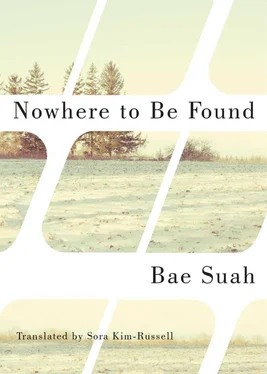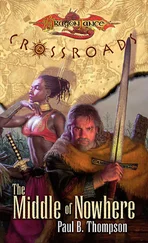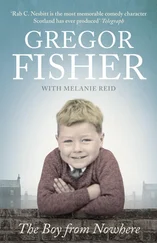“I’m never getting married.”
“Of course you will. You’ll marry Cheolsu,” he said, grinning.
Don’t say that, brother. You know as well as I do that this is all just theater.
I went with my brother to the bank so that he could take out the loan, and on the way back we had our photograph taken. I combed my hair neatly and reapplied my lipstick in the mirror at the photo studio. Our family had never taken a picture together in a studio. But there it was, right on the way home, as if we were seeing it for the first time. My brother stroked my hair and said, “Let’s take a picture.” We held hands in front of the camera. His hand was hot, as if he had a fever. Then both of our hands were sweating. If I never saw him again after that day, I would think of him a hundred years from now. That photo of him was the last I would see of his face. His final face in some distant future. My brother and I clasped hands tightly, sweat slicking our palms, as if we’d planned it that way from the start.
Then, just like that, he left for Japan with the other employees of the janitorial company. I did not attend the Christmas party at work. My mother and I made Christmas cards to send to people in prison. It was so cold in our poorly heated house that we had to keep blowing on our hands as we worked. When the new year began, I would have to find a new job. Each morning I opened my frost-covered window and looked down at the dead, bony trees lining the road. A new low-income apartment building was going up across the street. That meant the dye factory next to its polluted stream would shut down, but I did not yet hear the sound of construction.
“If only he could have worked at that construction site instead of going so far away,” I muttered to myself.
My mother paused in the middle of gluing a card and shook her head.
“No, men are supposed to aim high and strike out on their own,” she said, her voice filled with conviction. “They can’t get by as day laborers forever.”
“Do you really think he’ll come back?”
I stared out the window as I asked. Maybe she did know everything after all. At least on days like today, when she wasn’t drinking.
“Of course. That child came out of my belly. No one knows him better than I do. I have faith.”
She was unshakable. She kept brushing on glue and did not turn to look at me. Perhaps I still had something to learn from her, my poor alcoholic mother. Despite having eaten at the same dinner table with my family long enough to feel ashamed of them and turn red with embarrassment because of them and feel wretched with them and never breathe a word of my own feelings to them, I would in the end encounter that other me in the mirror. Maybe with time Cheolsu and I would become similar people who sit at a similar table and have similar conversations over dinner and then appear in my mirror. The Cheolsu in the mirror hands me the frozen chicken carcass.
There. Have some chicken. You’ll feel better.
Cheolsu, I will eat your chicken when that day comes. I will gladly become your toilet. When I can, for once in my life, for a brief moment, become ardently pure. When that day comes.
“Did you have a nice visit with Cheolsu?” my mother asked out of the blue.
“That was a while back.”
“How is he?”
“I didn’t see him.”
“You didn’t see him?”
“Nope. Cheolsu wasn’t there.”
Cheolsu was not there. Cheolsu fell like a crow from a white cliff while I wandered through a village of soldiers in the snow carrying Cheolsu’s dead chicken before returning home and falling ill. Did Cheolsu know? Cheolsu grows up to become his mother and his father. Just as I grow up to become my mother and my father. But the other Cheolsu, who fell from the white cliff, and I would pass by in silence outside the window of an abandoned house in the rain. Rain falls on the corpses of time.
My mother and I put the finished Christmas cards and candy in envelopes.
“You and Cheolsu don’t make sense together. I never understood why you two were so close for so long.”
“You don’t have to understand it. But he’s gone now. I won’t be seeing him again.”
“He was stupid and slow.”
“Please, I beg of you, stay out of it. What do you know anyway?”
Would my father get his card and his candy? Before he went to prison, he told us, “I want to kill myself. I didn’t do anything wrong. Send me letters on poisoned paper. I’ll swallow them whole.”
Instead we sent him poison-free Christmas cards and candy. For all I knew, he might have eaten every page of every book we ever sent him. He’d have been better off looking for a different method. My little sister pranced into the room. Her latest dream was to become a model. Up until recently it’d been to become a beautician. She said she didn’t remember much about our father.
“Studying sucks,” she said, tossing her book bag on the floor before taking off her shoes. “I’m not going to study anymore. I don’t know why anyone would throw their whole body and soul into something so pointless. Being first in class or getting perfect grades is easy as long as you set your mind to it, but I can’t see myself doing only that all the time. There are so many other things that I could be doing.”
She was the only one among us who had hopes for her future.
“I’m going to be a lesbian when I grow up,” she told me, as I jotted down a note in the card for our father. “Then I’ll be in a whole new world. There’s got to be something completely different out there — not just what our eyes can see. My friends think it’s a genius idea.”
She was talking about transcending your origins and your own willpower. Since she was the only one among us who’d gone on a class trip, maybe she could actually accomplish the things she said. Each time I wrote a note to my father, I hesitated. I knew full well that what my father wanted was not these silly notes telling him how the family was doing. Silence. The silence inside a prison. The prison of time called life. The prison of class and circumstance. The prison of a code untranslatable into the language of the other. The prison of the flesh. The prison of sweaty hands that can’t let go even at the moment of falling. The prison of Cheolsu.
Dear Father,
Our older brother has left for Japan. His visa is only good for one year, but he might never come back. He will spend the rest of his life in Osaka’s sewer, inside tunnels flowing with black wastewater, because down there the police don’t bother looking for illegal immigrants. Mother had only half a bottle of soju yesterday. She sobered up after an hour.
He wouldn’t be interested in reading any of that. Mother was writing the same letter she wrote every year, a letter she would send to an advocacy group. An endless litany of excuses regarding an old incident that no one cared about or believed in anymore.
“It’ll be different this time.”
She never lost hope.
“The church has taken an interest in my letter. Eventually they too will believe me when I say that he didn’t abuse his power to take bribes or make himself rich through illegal means. There might even be protests in front of the courthouse or the prison.”
“Does this church know that you drink?”
“The church will help.”
“Mother, he’s not an activist or a political prisoner or even a prisoner of conscience. Don’t you get it? These days, if you’re not one of those people, then no one cares.”
“But he is innocent!”
“What does it matter now? Besides, do you really believe that? I don’t.”
“What are you talking about?”
“The truth is that, one way or another, he was corrupt. I don’t think anyone is really qualified to say they got a fate they didn’t deserve. No one is ever completely innocent.”
Читать дальше












